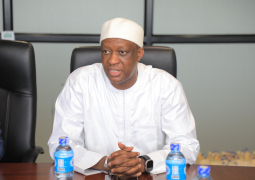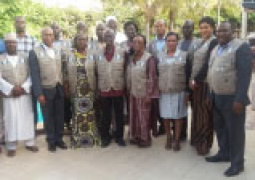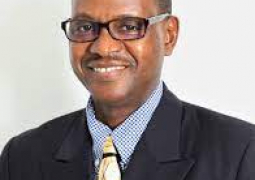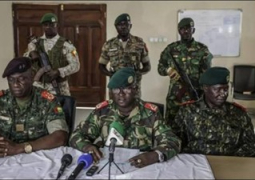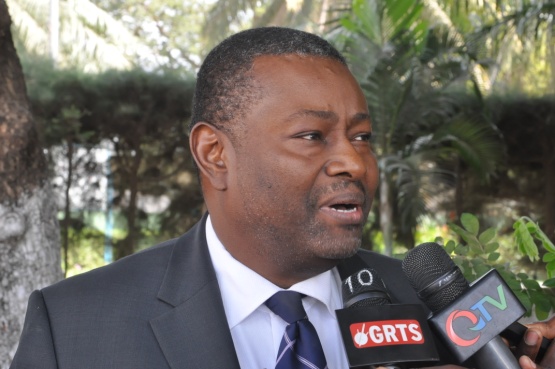
In what began as a period of honeymoon between the media and the Barrow government, international human rights watch dogs and campaigners have expressed concern over the ongoing situation of journalists’ trial significantly threatens press freedom and undermines The Gambia’s standing as a beacon of free expression.
Between 2017 to 2018, Gambians were joyous over an end to the era of Yahya Jammeh. The new government acknowledged roles in change of government, begun the process of repealing the Criminal Code as a show of their commitment to media law reforms. This Code has been applied in suppressing wide ranging acts of press freedom under the regime of Yahya Jammeh, including arbitrary arrests, prosecutions, detentions and securing convictions of many journalists.
Now it seems that scenario is beginning to reappear all over again, with the obstinate persistence of prosecuting journalists Musa Sheriff and Momodou Justice Darboe proceeding in the Kanifing Magistrates’ Court. It involves the recent arrests and charges against two editors of The Voice newspaper, accused of publishing false news under Section 181A of the criminal code.
Writing on behalf of the Committee to Protect Journalists (CPJ), an independent organisation promoting press freedom worldwide, Angela Quintal, its Africa Programme Coordinator asked for the intervention of the National Human Rights Commission describing it as a situation that “significantly threatens press freedom and undermines The Gambia’s standing as a beacon of free expression in West Africa following the era of Yahya Jammeh.”
The petition was copied to the Minister for Justice & Attorney-General, Dawda A. Jallow. The minister for Information, Dr Ismaila Ceesay. Director of Press and Public Relations, Office of the President: Amie Bojang-Sissoho, Media Council of The Gambia Chairperson, Mr Baboucarr Cham. The Gambia Bar Association President, Neneh Cham. The Newspaper Publishers’ Association Chairperson, Mr Pap Saine. The Gambia Press Union President, Muhammed S. Bah, The Voice Editor-In-Chief Musa Sheriff. The African Union Special Rapporteur on Freedom of Expression: Ourveena Geereesha Topsy-Sonoo. The United Nations Special Rapporteur on Freedom of Expression, Irene Kahn, and the Resident Representative of the ECOWAS Mission in The Gambia: Amb.Miatta Lily.
“CPJ believes that if this case proceeds to trial, it could set a dangerous precedent for media freedom in the country, Quintal wrote in a petition to NHRC Chairman last week.
A Criminal Offences Bill 2020 was introduced in the National Assembly of The Gambia, seeking to replace the Criminal Code that was being applied by Jammeh regime against journalists. However, it has been stuck at the Committee Stage of the Assembly since 2022. This Bill replicates the “false publication and broadcasting” law, as another draconian provision in the country’s law books.
“We recognise the critical role of the National Human Rights Commission in monitoring the implementation of the Truth, Reconciliation and Reparations Commission's recommendations. This includes the crucial call for the government to repeal all repressive legislation and to finalise a comprehensive reform agenda aligned with the recommendations of the Media Law Review Committee. While accepting some of these, we note that the government rejected those calling for repealing of the sedition and false news. Additionally, we note the landmark ruling by the ECOWAS Court, which directed the Gambian government to immediately repeal or amend laws related to criminal libel, sedition, and false news,” CPJ’s petition stated.
The President of the Gambia Press Union, Muhammed S. Bah, said: "These laws have been declared unconstitutional by the Supreme Court of The Gambia since 2018. However, they tend to be replicated in intent, in the new False Publication and Broadcasting Bill that’s about to be introduced in the National Assembly."
For the GPU, this signals a downward trend of hard-earned press freedom status that the country’s press began enjoying after paying dearly for it over 22 years of dictatorship. In the 2024 World Press Freedom Day Commemoration, the Union’s Secretary General, Modou S. Joof, said the GPU has documented over 15 attacks against journalists since 2017, none of which have been investigated nor prosecuted.
During the political transition, the only legal case that was found to be threatening press freedom happened when the coalition Minister for Agriculture sued an online network demanding hundreds of thousands in compensation for alleged defamation, after a story exposed cross border sales of government subsidised fertiliser. The case was, however, settled out of court.
However, in 2019, two radio stations were closed by directives from Ministry of Interior, following a major protest against government of President Adama Barrow, demanding he respects three years transition agreement signed among opposition coalition. These stations were alleged to be inciting the protests by giving voice to protesters. A detachment of armed police unit sealed off Home FM, King FM and they remained off-air until a meeting between Minster for Justice and National Human Rights Commission resulted in re-opening several weeks later.
In 2023, PURA wrote to two private radio stations, threatening to revoke licence as content from their talk shows were found to be incitement against President.
The Chairman of the National Human Rights Commission, Mr Emannuel Joof, acknowledged receipt of the petition sent by the CPJ, and said it shares concerns about these developments, which pose a serious threat to press freedom in the country.
“The NHRC recognises the critical role that free press plays in sustaining democracy and promoting accountability. As such, we are actively using our advisory role to the government to engage with the relevant authorities. We are advocating for the charges against the named journalists to be dropped and are pushing for a review and revision of all laws that undermine press freedom, in line with regional and international obligations under treaties to which The Gambia is a party.
“Furthermore, the Commission remains committed to supporting broader reforms to repeal draconian legislation affecting the media, as highlighted by both the Truth, Reconciliation, and Reparations Commission (TRRC) and the ECOWAS Court's ruling on criminal libel, sedition, and false news laws. We continue to engage with government stakeholders on the need for urgent reforms that respect the freedom of the press and uphold human rights standards,” the Chairman said in its letter dated 14th October 2024 to the CPJ.
It lauds the Committee to Protect Journalists’ “consistent efforts” in defending press freedom in The Gambia, not least during the dark times of the country’s political dispensation under Yahya Jammeh.
When last the CPJ dispatched a delegation to The Gambia, it was in 2004 over the murder of Deyda Hydara. However, they were denied entry into the country by the authority of the then Minister of Information, Neneh McDoll-Gaye, who today has been appointed chairperson of the Access to Information Commission established by government.
In 2022, Gambia was ranked 50th globally on the World Press Freedom Index. This was a significant improvement from 2021, when it was ranked 85th. This ranking improved further to 46th globally and 5th in Africa. With Jammeh’s former henchmen closing in on Barrow, analysts fear that worse days of the media are nigh, and ongoing situation of the trial of these journalists’ significantly threatens press freedom and undermines The Gambia’s standing as a beacon of free expression.


